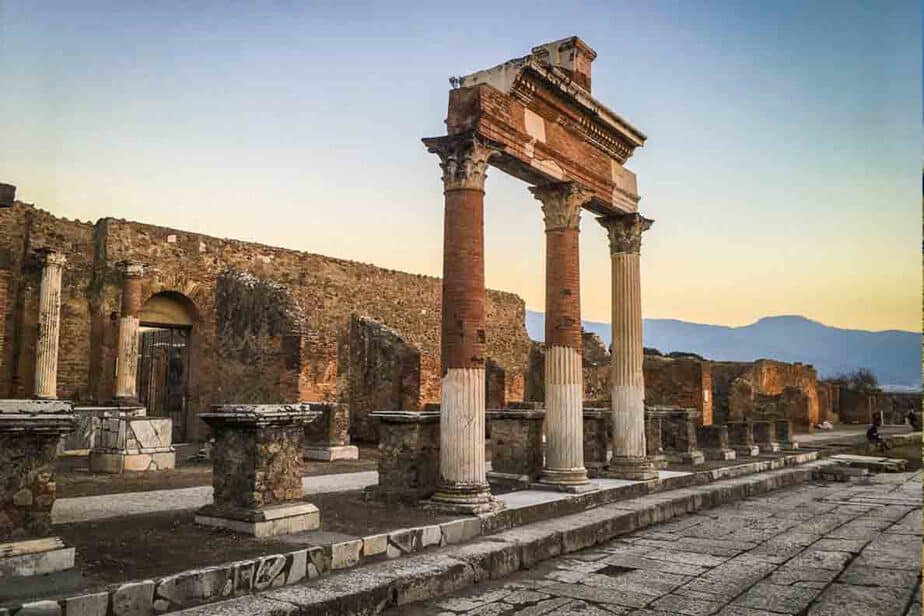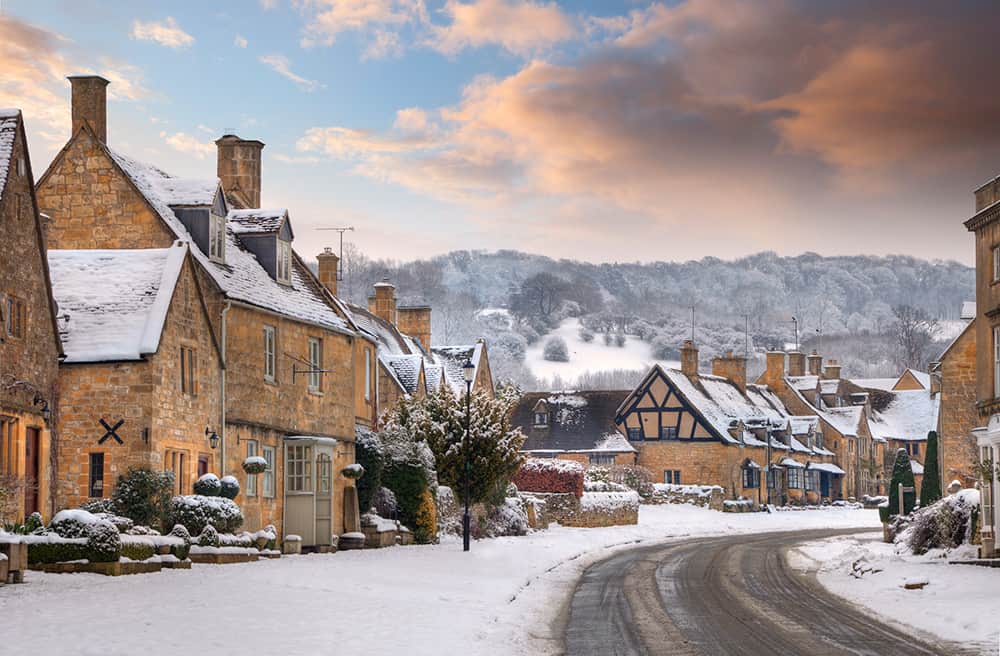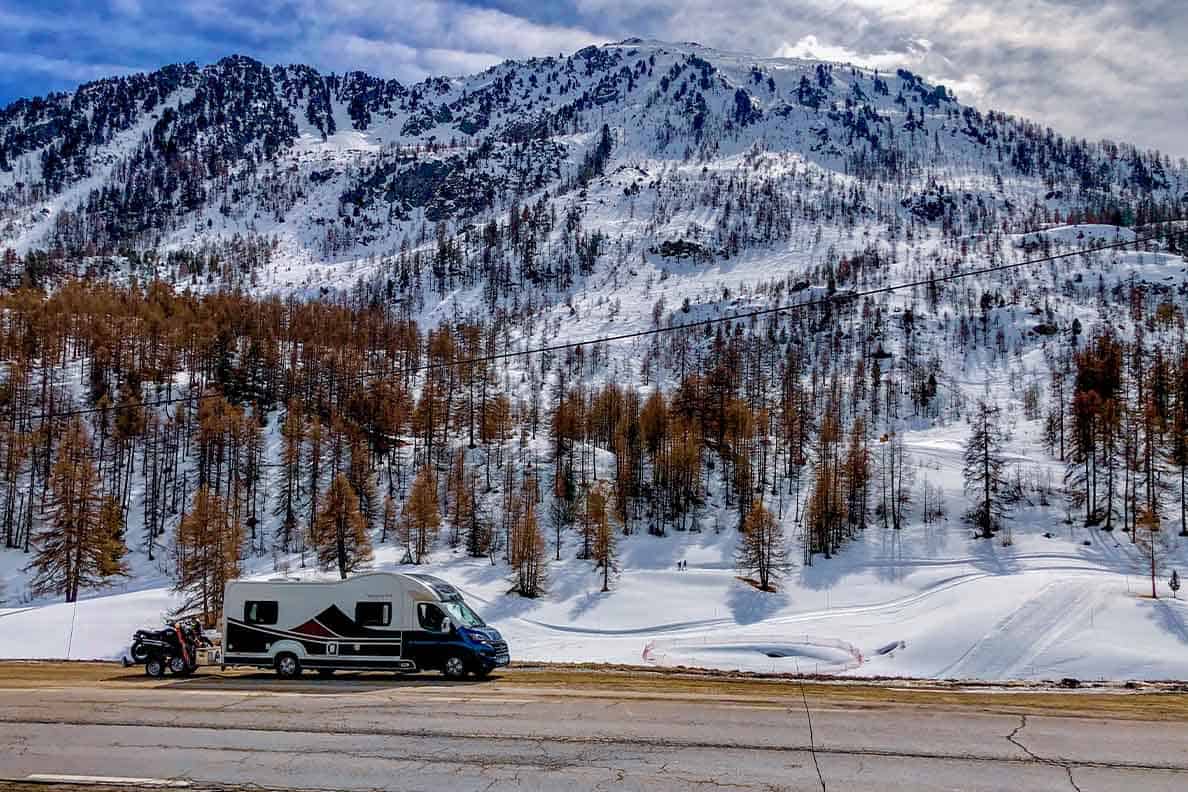Winter Motorhome & Van Life: 30 Essential Things to Know
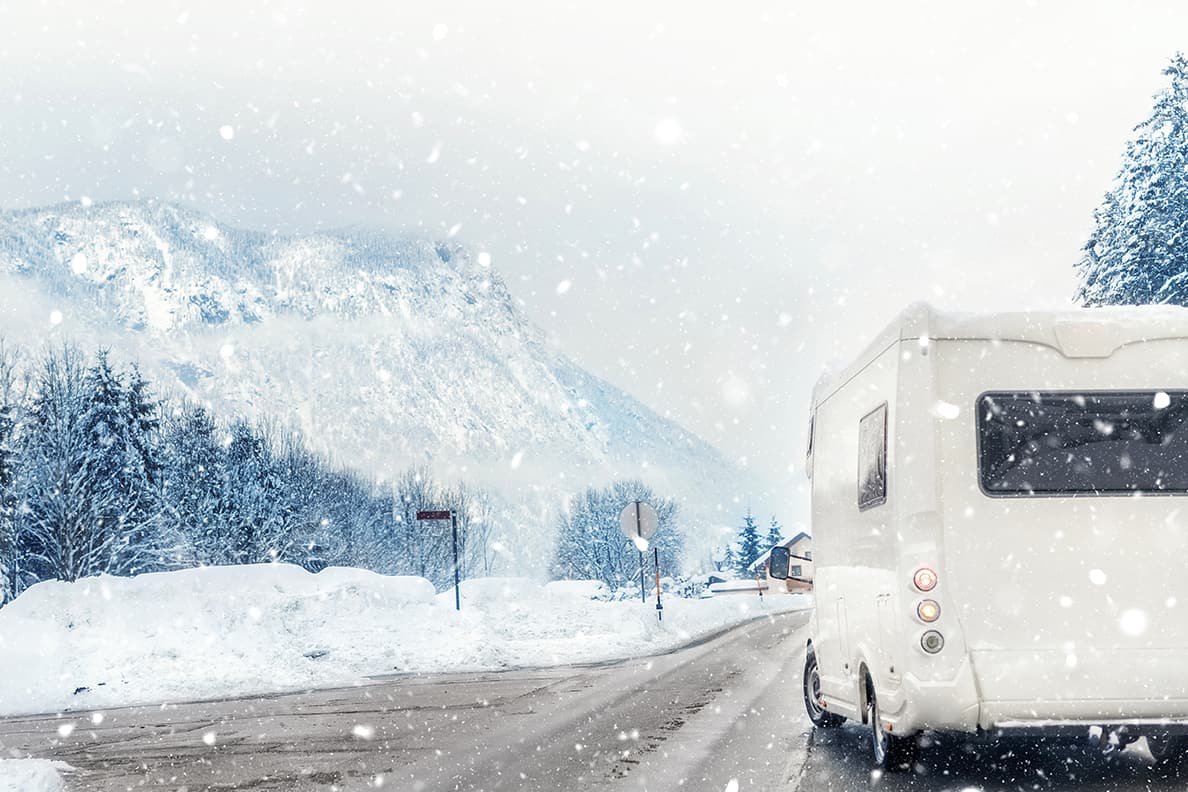
Planning to live and travel in your motorhome this winter? Before you set off, there are some things you need to know about winter motorhoming, living in a van during winter and how to stay safe (and warm!) in colder weather.
*We work hard to make this the best motorhome travel blog and road trip website possible, full of helpful content for you. The website is supported by our readers, so if you buy through links on this site we may earn a commission- at no extra cost to you. All opinions remain our own.
If you find this post useful, you can also treat us to a coffee – we promise to enjoy it while creating more useful content like this- we might even indulge in a biscuit (or two!)
JUMP AHEAD TO...
Winter Van Life- the challenges
When I quit my job to travel in a motorhome almost fulltime, I never really considered the winter.
Oh, we thought about it in a fun way- should we go skiing (more on that later) or head up to Norway to see the Northern Lights or head south to Spain for some winter sunshine?
But I never considered how we’d carry snow chains- would we cart them around all year or store them somewhere during the summer?
What about winter tyres- when would we change if we were travelling away from the UK? Where would we store our summer tyres? What about a warmer duvet- would we carry two all year?
Can you use a motorhome in winter?
Absolutely. Many motorhomes can be used all year around and the ‘off-season’ definitely has some advantages. You just need to know how to manage the downsides of winter camping before you set off on your epic winter road trip in Europe
Pros of winter adventures with a motorhome or camper:
- Far less tourists at popular sites- this is the time to visit cities like Rome, Venice or Paris, but also busy and historic places like the Menin Gate war memorial in Ypres or Neuschwanstein Castle in southern Germany.
- Many places are covered in snow, making the photos magical. It’s also a must if you want to go skiing!
- If you enjoy night photography, you can get some epic photos on clear, crisp nights.
- The roads are generally quieter (except key days like Boxing Day
- Campsites are less crowded
Disadvantages of winter motorhoming road trips:
- Many attractions and places of interest close for the winter
- Many campsites close too, so spaces at the ones available are sought after. Try to avoid grass pitches if at all possible.
- There are fewer hours of daylight, so less time to explore
- Road conditions can be difficult in freezing temperatures, especially in snow and ice.
- Your motorhome can suffer from damp, condensation and mildew if you don’t care for it properly (more on that later)
- Drying clothes and laundry can be a pain (more on that later too)
- Strong winds and rain can be tough to sleep through (ask any of us who survived Storm Denis in a van!)
- It can be COLD (unless you’ve gone south) so you’ll use a lot of fuel for the heating system and it takes longer to warm up the water heater/water tanks.
Over the years, we’ve got a routine down for our winter trips, and we know the pitfalls to look for and how to deal with them.
Winter Motorhome van life- the reality
Here’s a video of the things I’ve learnt whilst living in the motorhome full-time during winter. It was a STEEP learning curve. I hope you find it useful.
We hope you found the video useful. If you did, we’d love it if you followed us on Youtube. New videos with tips for motorhoming and campervanning in the UK and Europe are released weekly.
Types of winter motorhoming & van life
There are several types of people who use their motorhomes in the winter, broadly categorised into:
- The ones chasing winter sunshine
- Others chasing snow and mountain life
- Those who live fulltime in their motorhome or campervan
- Everyone else, who just enjoys exploring and spending time in the can when possible, even during winter.
Each of these groups has slightly different considerations, although much of the planning stays the same. Let’s look at the differences below
Winter motorhome life in the sunshine
For anyone who wants to get away from the dreary UK winters, heading south to places like Spain or Portugal in a motorhome is the perfect solution.
Of course, the BREXIT rules of only being able to spend 90 days in every rolling 180 has made it difficult to stay away all winter, but it’s still possible to spend nearly 3 months in the sunshine.
If this is how you’re planning to spend your winter in a motorhome, then there’s not a whole lot you need to do differently than during the summer, although don’t forget you now need to comply with the French winter tyre law (even if you’re just passing through.)
If you are driving your motorhome or campervan through France (as well as all the rest of the gear you need- grab your FREE Europe travel checklist below.)
It does also get chilly in winter in many places in Europe, even if you’re heading further east and going motorhoming in Croatia or Greece. We can make no guarantees, but if you’d like some ideas for places to stay or visit, here you go:
Chasing the snow- motorhome skiing
If you’re the other end of the spectrum and looking for snow, there’s quite a lot you’ll need to do to prepare your motorhome for winter in the mountains.
Gear you need to carry for winter campervanning in the mountains
As well as the usual gear you need for motorhome touring in Europe, you’ll need to carry:
- snow chains (make sure you know how to fit them in advance and TEST them!) We accidentally bought the wrong size and they didn’t fit. 🙁
- You may need winter tyres; like the new French winter tyre law
- Shovel- an essential for cold weather camping
- Long-handled brush
- Bucket/ bowl to collect grey waste
You’ll also need to check your camper van heating is working fine- whether you use a diesel furnace, traditional Truma blown-air or propane heating system or something like a space heater. You’ll probably also need to insulate your vehicle, especially the pipework and put an extra rug/ carpet on the floor.
Make sure you’ve had a full service on your motorhome or campervan before you go and top up the screenwash; salt on the roads means you’ll use it a lot more than usual.
If you’d like more tips and tricks, check out our post on motorhome skiing here, which tells you everything you need to know before you go.
Living fulltime in a van in winter
For anyone who lives in their motorhome, RV or campervan fulltime, winter brings its own challenges.
Like everyone who uses their motorhome in the winter, even if only for a weekend, you’ll be facing condensation, cold, wet clothing, and more. We’ll go into each of those challenges below.
What’s the Best Motorhome for winter use?
Many people wonder which motorhome to buy for winter use or winter RV living and if it’s possible to use a motorhome in winter, even a British model, like a Swift.
I can safely say that we went motorhome skiing with our Swift- and it was fine. Sure, it was a little chilly, and we needed to insulate the pipes and holding tanks a little better, but it did the job.
Of course, European manufacturers from countries which are used to mountains and snow will have a higher insulation level (some even have an extreme weather package and heated hoses), but they also cost more, so do plenty of research if you’re planning to spend a lot of time in cold environments in your motorhome.
Winterproof vs Winterised:
- “winterproof” means the motorhome can be warmed up to a temperature of 20℃ (from 0℃) within two hours, then stay fairly constant.
- “winterised” means the temperature should reach 20℃ from -15℃ within 2 hours, and the plumbing should work normally.
Planning a winter motorhome trip- things to consider
If you’re planning a winter motorhome trip or winter RV camping, there are plenty of things to consider.
(If you’re new to motorhoming and want some help with where to start, here’s how to plan EPIC motorhome trips anywhere you want to go.)
The biggest problems with using a motorhome or campervan in the winter include:
- Where to stay
- Weather conditions and safety
- Storage
- Gear to bring
- Staying warm
- Dealing with damp and condensation
- Dealing with wet clothes and muddy/ wet boots- drying them
- Solar power and managing resources
- Finding fresh water and emptying water- and stopping the fresh water tank or waste tank hoses freezing!
First, we’ll consider where you’re going to stay overnight.
Motorhome campsites in winter
Many campsites around the UK and Europe close during winter, which can leave finding somewhere to stay tricky.
We recently took our motorhome down to Biarritz in southern France- STUNNING place to visit if you get a chance. Grab your France travel checklist here:
But we struggled finding a campsite which was still open. Many places shut around the end of October and don’t reopen until Easter.
There are two methods we use to combat this and find campsites which stay open all year.
For Europe
We’ve been members of the ACSI Camping Card scheme for a few years now and it’s brilliant if you’re able to travel outside of peak season (which is usually end of June until September.) If you can go to Europe outside these times, you’ll save yourself a fortune with an ACSI card.
Even better, their website/ app/ book are great places to check to see when campsites close. There are enough which stay open all year; you just need to find them. There’s usually at least one near every major city/ popular area. Of course, the more popular the area, the quicker you’ll need to book.
The other method we use in Europe is to use Park4Night and find campsites near where we want to go, and then Google the website of those campsites and see if they’re still open. If they are, we book (usually by phone or email.)
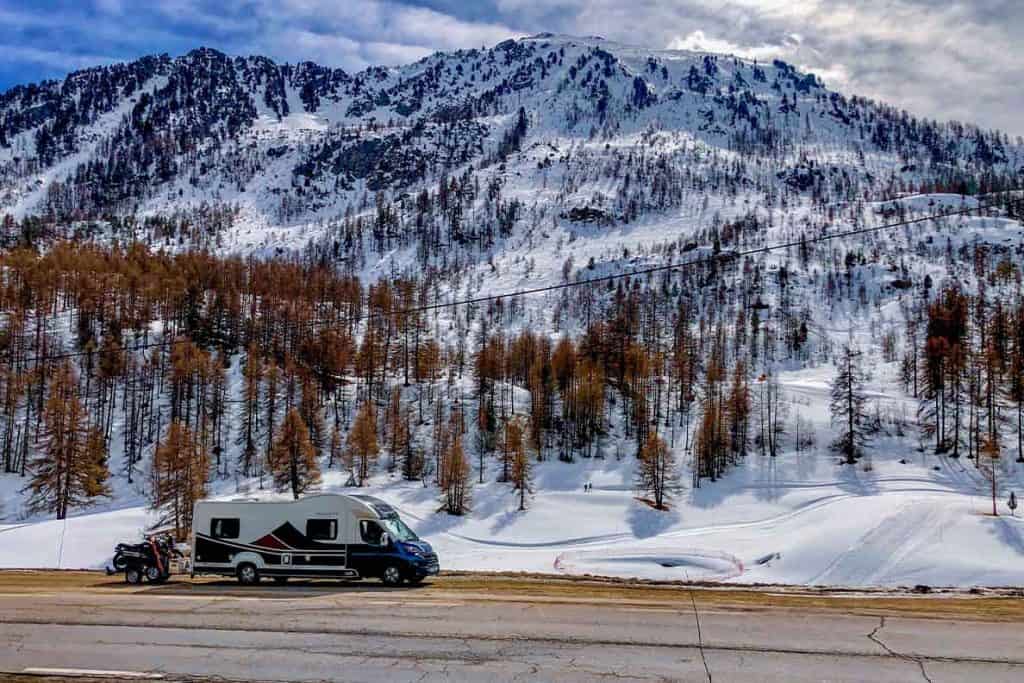
For the UK
Campsites for UK winter road trips can a little bit tricker. ACSI does have some UK sites, but they don’t show all the ones which are open all year.
We use an app called Search for Sites to find campsites near our destination, then check their website or phone to ask. Yes, this can be laborious and frustrating.
Another option is to use a website like Pitchup.com, which allows you to search for your dates, requirements (like a motorhome hard standing pitch with electric and which allows dogs) and then you book through them.
Lastly, if you’re a member of a motorhome club, you can use their website or book to find places.
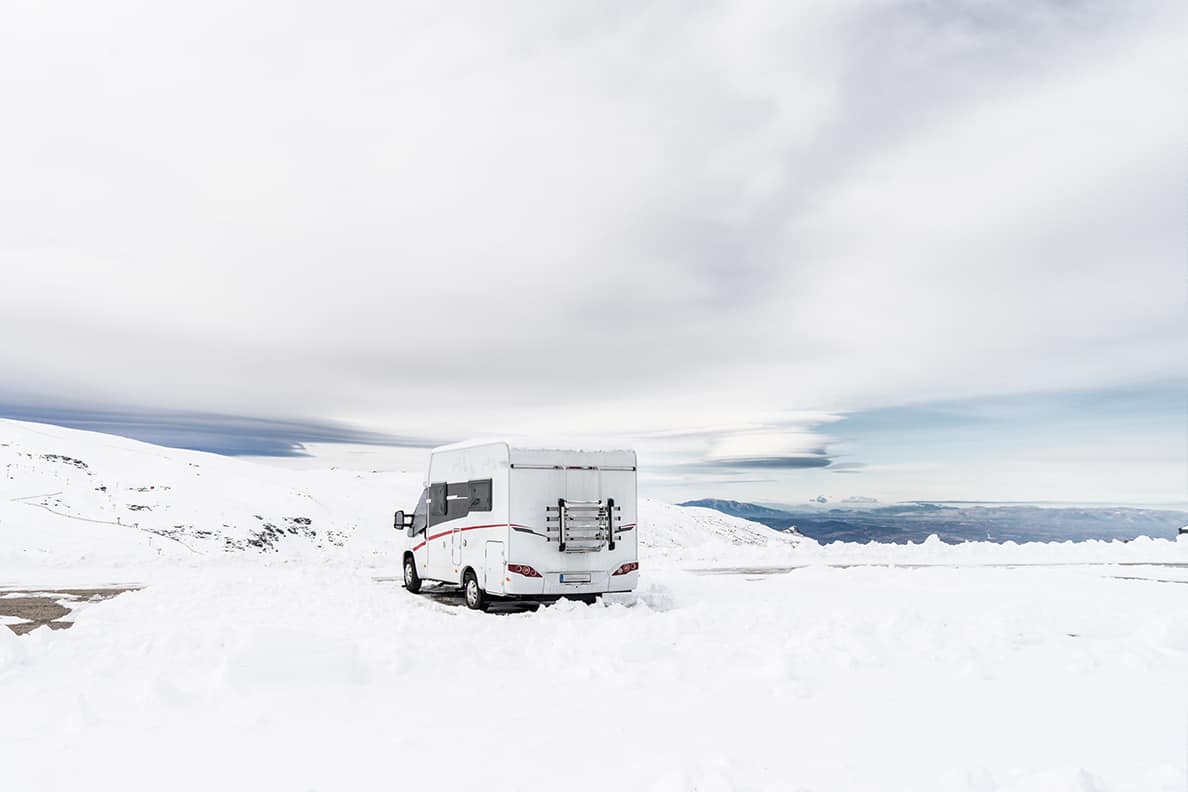
Aires in Europe in winter
Many Aires in France and Europe stay open all year, unless they’re closed for maintenance or due to heavy snow (or the roads close to them being closed.)
Still, there are enough of them that if you only want to stay somewhere for a night or two as you’re travelling through, they make the perfect stop.
Just remember, ones near mountains may well be closed and if they have facilities like water usually, the taps might be turned off to avoid damage.
READ MORE: How to find and use Aires in France and Europe
Other motorhome parking in winter
Of course, there are plenty of other schemes if you don’t want to use campsites or Aires. Schemes like Brit Stops and France Passion have businesses which are open all year, especially places like pubs in the UK.
You can, of course, still use wild camping spots with your motorhome or camper. Just beware of soft muddy places in forests- you’ll get stuck very easily.
Learn how to find overnight parking spots around the UK and Europe here
Consider the weather
Before you head off on your winter motorhoming trip, pay extra attention to the weather. Does the forecast include strong winds, fog, or snow?
None of those are much fun in a van. Don’t forget, you can always adjust your plans to suit whatever is forecast- that’s one of the best things about motorhoming.
Make sure you carry water, snacks and ideally some hot drinks- just in case.
Mice and Rodents in your van
The other thing to remember is that cold weather will cause mice, rats and other rodents to look for shelter… and they really love hiding in motorhomes and campervans.
There are ways to deter them (humanely!). Here are our top tips for deterring mice and rodents in motorhomes and campers.
You can also see the damage they do in this video!
We hope you found the video useful. If you did, we’d love it if you followed us on Youtube. New videos with tips for motorhoming and campervanning in the UK and Europe are released weekly.
Gear to carry for winter motorhome life
Apart from winter/ all-weather tyres and snow chains, there are some things we’ve found VERY useful when motorhoming in winter (and even Autumn!)
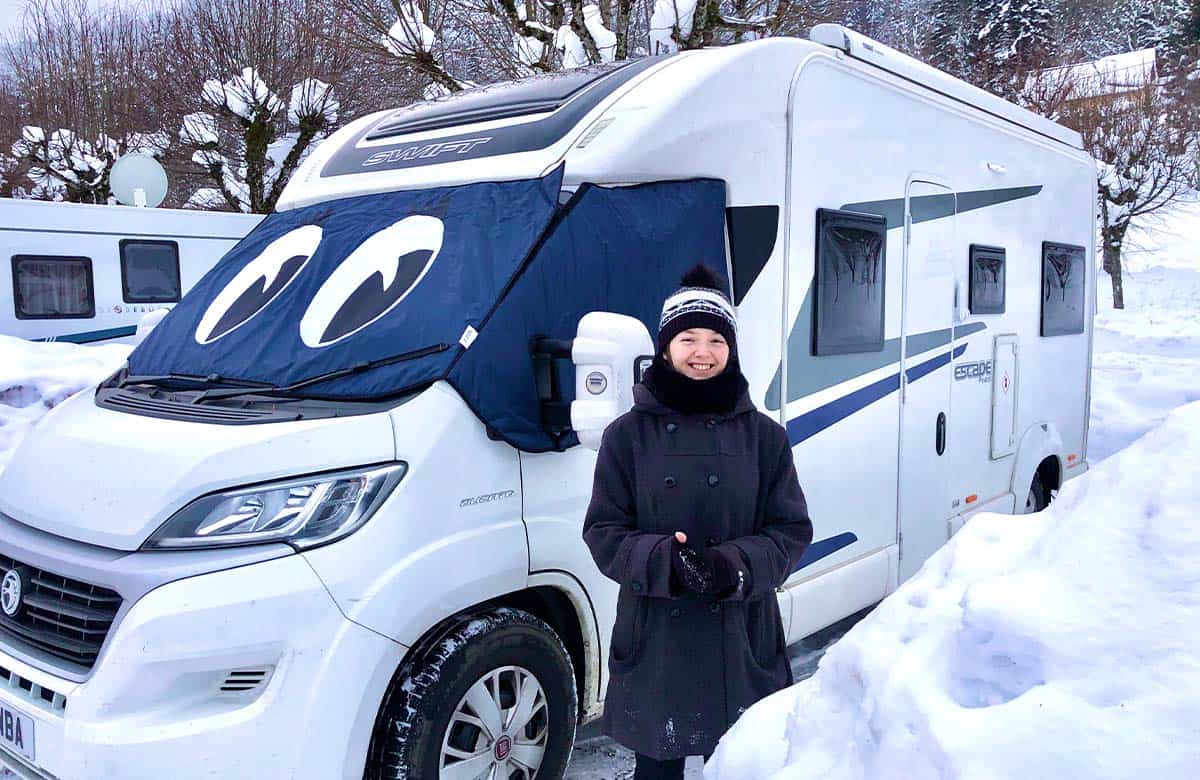
Mud Mats/ Traction Grip mats
These things are a lifesaver. Last year, we broke all our own rules and camped up on a grass pitch.
And got stuck.
Trying to push a 3.5ton motorhome out of the mud or off wet grass is never going to happen and without these we’d have been stuffed (you can use the carpets from inside your van if you’re really stuck, but they’re be ruined. Save yourself the worry and carry a set of these all year round.)
Groundsheet
We don’t usually use a groundsheet when we’re motorhoming. Most of the time, we stay in Aires or wild camp, so we can’t get it out and on a campsite we often use a hard-standing pitch rather than a field.
However, in winter a groundsheet becomes a necessity in many campsites. It stops us bringing so much mud into the van- especially as we travel with a mud-loving cocker spaniel.
Get one like this which can be pegged out securely in the corners so doesn’t fly away and which is wipe-downable. Some people prefer two smaller ones so they can use a smaller size when needed.
Screenwash
Screenwash is more important in winter than at any other time of year. There’s so much salt and grit on the road that it can make the windscreen extra dirty.
Make sure you top up your screenwash and bring extra. We love this one as it’s made for all year use, even in colder climates, so won’t freeze on you when you need it most. The Demon Ice spray is also great as it slows down re-freezing
Don’t forget an ice scraper if you don’t have one already! You’ll need one with a longer handle like this so you can reach all off the windscreen!
Interior mat
Whilst we’re trying to avoid mud and wet footprints in the van, get a mat like this (pawprint optional!) We’ve used these for years on both the camper and our boats and they really are fantastic for soaking up water from both dogs and humans if you wipe your feet (paws) on them!
It’s easy to clean with a jet wash when you’re cleaning your van but will last a long time between washes if needed.
Drinking water
Most aires and campsites will keep a tap running. DON’T turn this off- it’s running so that the pipe doesn’t freeze (running water is harder to freeze than static water in the pipe.)
It’s up to you whether you choose to drink from your motorhome tank or not. We used to always drink from our LifeSaver Jerrycan, which purifies 99.9% of all contaminated water, making it safe to drink.
However, this year we fitted an inline water filter, which means the water which comes out of the tap in the kitchen is already filtered. It’s SO much easier.
The only downside is that you need to keep an eye on your water consumption, which includes things like showers, as it’s all coming from the one tank, rather than giving you a backup water supply just for drinking.
READ MORE: How to find drinking water & empty waste on the road
Winter motorhoming- damp and condensation
Condensation in a motorhome or campervan is a pain in the backside and is one of the biggest issues with winter motorhoming. There are several ways to reduce the problem, but very few which get rid of it completely.
Despite the cold, your van will benefit from a little ventilation, so try to open a window at least once a day for some fresh air.
Some people run a dehumidifier, but you might struggle with electricity for that. Non-electric damp boxes or pouches (like the ones you put in wardrobes) are a good idea to soak up at least some of the moisture in the air.
See all our tips for reducing condensation in your motorhome here.
Dealing with wet/ muddy clothing
The biggest thing to figure out is how you’ll deal with damp clothes and wet/ muddy/ snowy shoes. Taking them all off at the door is essential (hence a groundsheet being useful), but where will you dry things when they’re wet? Where will you hang wet coats?
We are lucky that in our motorhome we have a heating vent in the bathroom, so all wet gear goes in there to dry overnight. Yes, it makes going to the toilet a MISSION, but it saves there being damp gear everywhere.
If you’re doing laundry on the road, this is the time to use site facilities or a local laundrette. Make sure everything is dry before you bring it back- having a van full of damp clothing is no fun at all.
If the campsite has a drying room for wet ski gear, use it.
Winter Motorhoming with a dog
If you’re travelling with a dog, there are a few things you’ll definitely need to stop them covering the entire van in muck.
Here are our top recommendations for winter vanlife with a dog.
Window Vac
One of the BEST motorhome accessories we’ve ever bought is this Karcher window vac.
It removes condensation from inside your windows in seconds AND it’s brilliant for when you need to clean your motorhome. All in all, worth every penny.
Thermal Screen
We LOVE our thermal screen from Rainbow screens. Not only is it a fun talking point, but it does its job exceptionally well, cutting down condensation and heat loss through the windows.
(Disclaimer; we were gifted the screen, but we’re not being paid or encouraged to include it in this post- we genuinely think it’s brilliant.)
However, we know it’s expensive, so here’s a cheaper alternative for you:
READ MORE: Epic motorhome and campervan gadgets to make vanlife even better
Winter motorhome living- Staying warm
Staying warm in a camper when it’s cold outside can be a challenge. You’ll probably want to add insulation to your van and definitely add another rug or carpet on the floor to keep it a little warmer.
Heating
Even if you’re chasing the sunshine down in Spain, it can still get cold enough to need heating in your camper during winter and in the mountains it’s essential.
Many campsites in the mountains don’t have 16 amp electricity supply and so your electric heating might not work as well as you are used to. It also means you need to be selective about how much electricity you are using at once (you don’t want to be THAT van which is constantly tripping everyone’s electricity…)
Gas heating works well, but you will use a lot of it- we use around 6kg every 2 days.
Diesel heating is a great alternative, but many vans don’t come with it as standard. If you do fit it, be aware of the weight and how it affects your motorhome payload. Another option is an oil-filled radiator, but make sure it’s low wattage.
12v heated blanket
YES, you can have a heated blanket in your motorhome. I know, I know- you’re welcome. One of the things my daughter HATED about winter motorhome living was that she got cold in the back seats if we didn’t drive with the heating on. This blanket fixed all that.
You can also put it UNDER your duvet before bedtime to warm the sheets- just don’t sleep with it on.
I also have a low wattage electric blanket in my van, which I run off my powerbank. This is the one I have.
(If you’re interested, this is the powerbank I have)
High Tog duvet
Is there anything better than snuggling under a warm duvet on a cold night? Make winter nights a little more bearable with a 15 tog duvet like this one (although obviously not if you’re going to Spain!)
Other tips include carrying a LOT of hot water bottles, wearing thermals and investing in some awesome fluffy slipper socks like these.
Managing power for winter motorhoming or living in a camper year round
If you’re on a campsite, you’ll probably have decent access to electricity. However, if you’re using aires or staying off-grid, you’ll need to pay more attention to your power consumption and how you’re going to top up your batteries.
Solar Power
You can’t rely on solar power during winter to recharge your batteries in the same way you can at other times of the year. The sun isn’t as strong, there are more hours of darkness and more areas of shade. Also, you’ll be using more power than you might normally.
If you already have a solar panel fitted, then by all means use what you can, but don’t rely on it as your only power source. If you’re planning on being off-grid a lot, a motorhome generator is probably a good idea.
Your motorhome Battery
Batteries do not like cold. They don’t run as effectively so you need to be more vigilant about looking after them, making sure they don’t run too low, giving them a good charge regularly and generally babying them. Find out more about looking after your motorhome leisure battery here.
You may also want to fit a motorhome inverter too, especially if you’re planning to stay off-grid a lot. This will help you make best use of the power in your batteries; just remember that solar is not so good in winter so it will take longer to recharge your batteries once you’ve drained them.
LED lights
We always recommend installing LED lights in your van to save power- especially if you’re staying off-grid a lot, but in winter it becomes essential as ‘normal’ bulbs drain the power too quickly. Make sure you bring spares- they’ll be on for longer during winter and you’ll probably need to replace a couple.
Cooking
Cooking in the motorhome can be problematic during winter. You want something hearty and filling, but the longer you cook, the more steam goes into the atmosphere, causing damp and condensation.
Also, if you’ve spent all day outside, you probably won’t want to cook when you return. That’s why we have a low wattage slow cooker which we use a lot during winter.
Of course, this relies on a decent electric connection. I’ve also heard good things about thermal cookers (but never used one), which doesn’t need power after the initial cooking and also good things about the Instant Pot. Both are worth exploring.
Of course, there are many ways to enjoy winter motorhoming. If you just like finding a campsite near your home which is open all year and staying in the van for a weekend, you probably won’t need to do much differently. You can even pre-cook hearty stews and bring it with you.
Similarly, if you enjoy staying off-grid and wild camping with your motorhome, you won’t need much extra unless you go somewhere very cold (like up a mountain!)
Just remember to check your systems before you go and do your pre-trip motorhoming checks to ensure your vehicle is safe in whatever conditions you might find yourself driving in (like heavy rain!)
I hope you found those tips for winter motorhome trips or living in a camper year round useful. You might find these related posts helpful too:

Kat never planned to buy a motorhome. She also never planned to quit her job as an air traffic controller, go touring around Europe in said motorhome, start one of the UK’s largest motorhome travel websites… or get a cocker spaniel.
Find out how she went from stuck in the rat race to being a digital nomad and inspiring thousands of people to have their own epic adventures here.
If you’d like to connect with Kat, send her an email or follow her adventures on social media.
Last update on 2024-04-18 / Affiliate links / Images from Amazon Product Advertising API



















